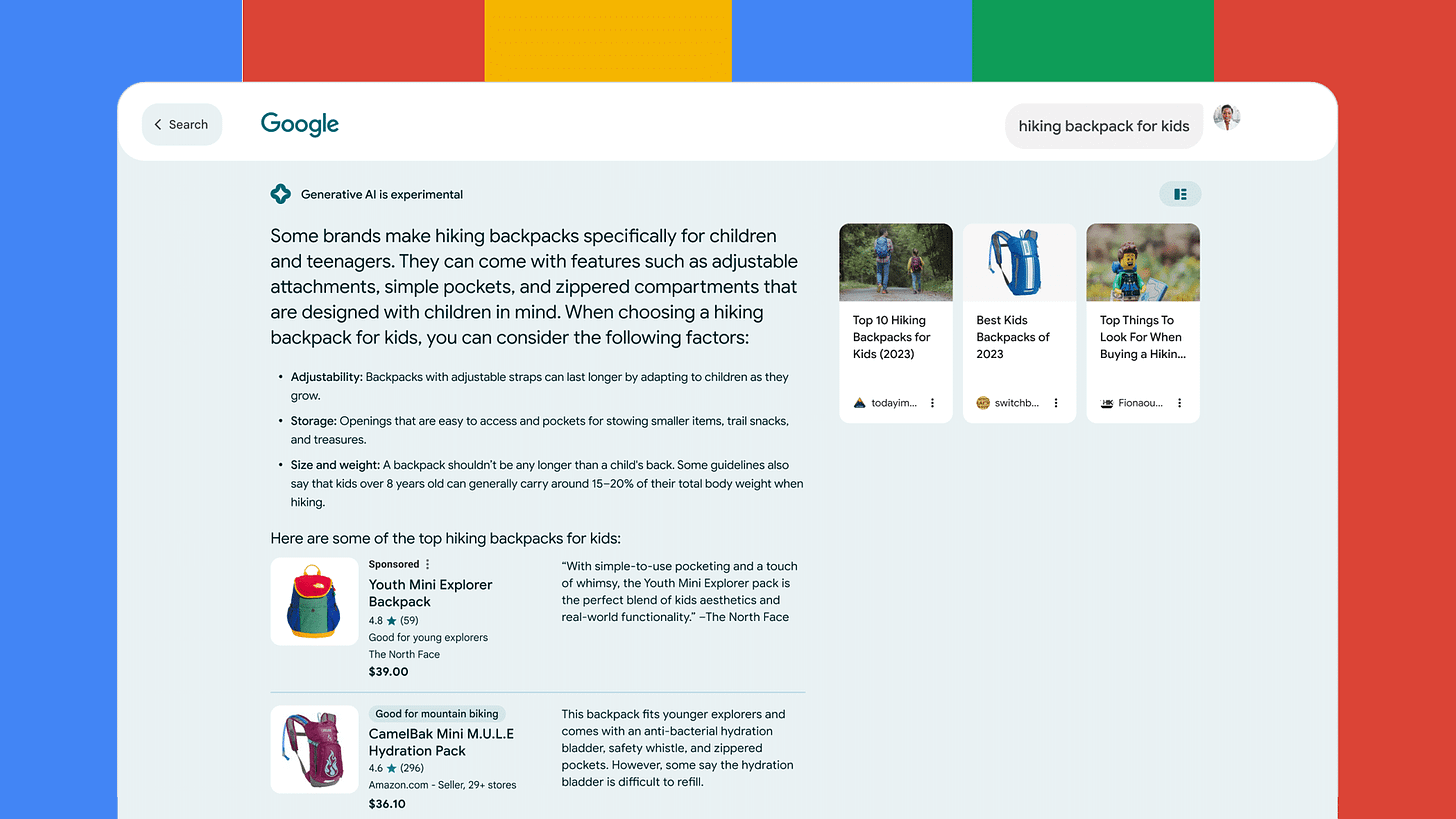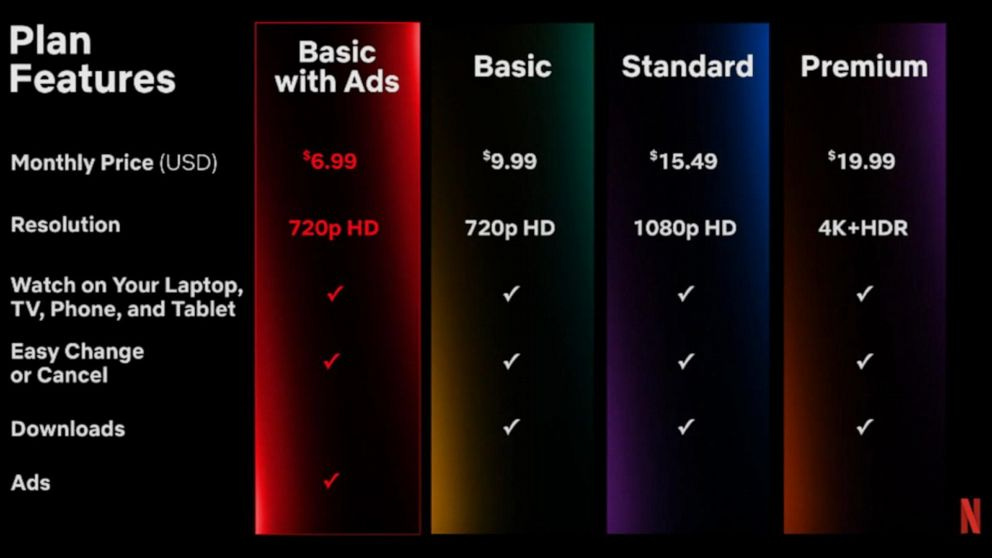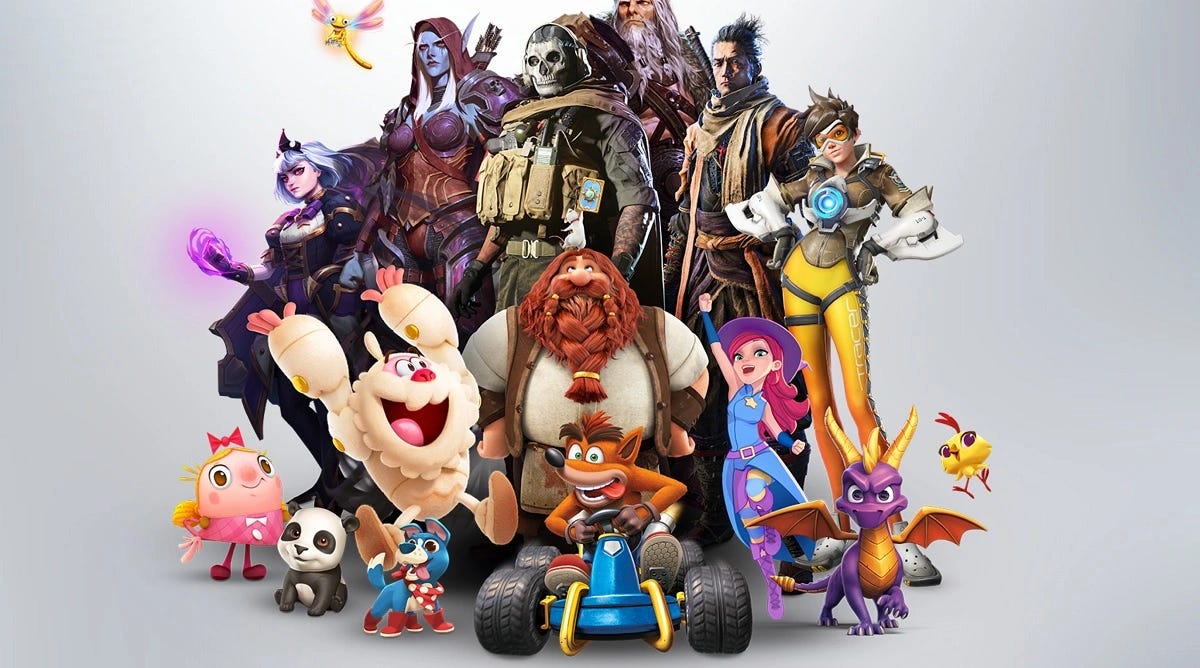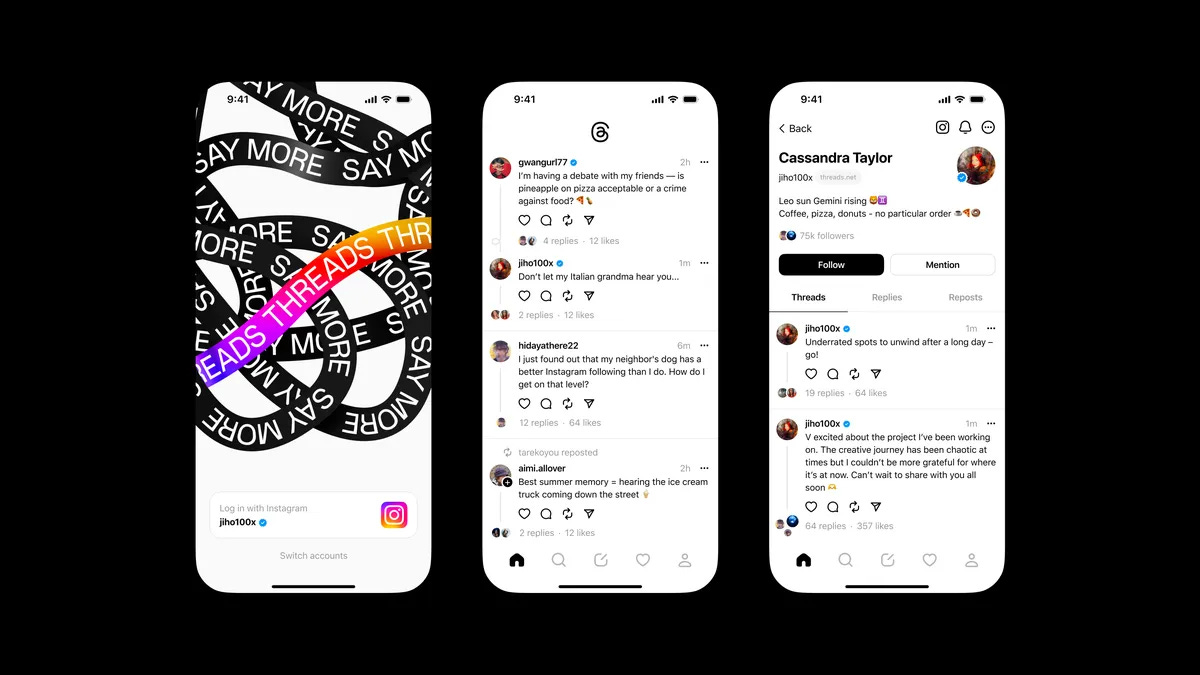Stuff Worth Knowing for the Week of July 17, 2023
Google pitches news writing AI, Netflix is avoiding live sports, and the FTC relents in its fight against the Activision-Blizzard acquisition.
Welcome back to Stuff Worth Knowing! Each week, I'll round up news related to tech, video games, film, television, anime, and more.
Google Prepares For The Content Ouroboros
What happens when AI search summarizes content already written by AI? We’re going to find out soon, I’d hazard. According to The New York Times, Google is currently testing a product called Genesis, which looks to be a way to generate news content. The idea is that Genesis can take in details about current events and then generate news stories from that.
Google sees Genesis as more of a personal assistant to journalists, automating some tasks. “In partnership with news publishers, especially smaller publishers, we’re in the earliest stages of exploring ideas to potentially provide A.I.-enabled tools to help their journalists with their work.” said Google spokesperson Jenn Crider in a statement to the NYT. “Quite simply, these tools are not intended to, and cannot, replace the essential role journalists have in reporting, creating and fact-checking their articles.”
Which tasks? Google points to headline options and “other writing styles”, though I’d point out you can just do that with Bard or ChatGPT right now. Google has pitched Genesis to several high-profile news organizations, including The New York Times, The Washington Post and The Wall Street Journal’s owner, News Corp. Assuming they decide to bring Genesis into their newsrooms, the implications of such a move loom large.
Google itself points to Genesis handling headlines and other writing styles, things that would generally be handled by editors and writers. I think that’s because it knows that Genesis probably can’t handle things like research and actual writing.
In terms of research, it’s well known that generative AI is prone to “hallucinations”, the euphemistic term for chatbots outright making up facts and lying. AI doesn’t have an understanding of context or fact. There’s a story in this week’s newsletter about AI-generated newsbots being unable to tell when they’re being faked out, which will become increasingly common.
We already have stories about the real-world implications of AI lies as well, whether that’s veteran lawyers using ChatGPT to file a legal brief full of fake cases, the professor who found found himself being accused of sexual assault during some research, or an Australian mayor who is suing for defamation because ChatGPT accused him of being a part of bribery scandal. AI lies, and it does so with great frequency and bravado.
What about actually writing? Let’s say you have three major news organizations all using the same tool for their standard news writing. All boilerplate daily news goes into Genesis, which spits out similar stories for each outlet. First, you lose any sort of differentiation in the news from outlet to outlet. An outlet’s voice is the combination of its editors and writers as a group, and here you’d be adding the same tool into the pipeline at each place. You’re diluting each site’s overall voice. That’s even before you get to the personnel implications: how are junior writers supposed to get to the point of being veterans and proper reporters if they aren’t getting a chance to actually write?
The final thought I want to leave you with is the one mentioned in the hed to this essay. Remember, Google and Microsoft are adding generative AI to Search and Bing. Google’s iteration of this is the Search Generative Experience (SGE), which looks to replace the classic “ten blue links” you generally see in each search. SGE scrapes bespoke articles and then generates an answer to a query. The issue is the answer doesn’t forward users to those original sources and it pushes articles down in search results.
The “content ouroboros” is Google’s SGE scanning a bunch of news articles all written by Google’s Genesis and then developing a summary based on those articles. A machine summarizing a machine’s work. It’s processed gruel all the way down, without proper context, fact checking, or distinct style. What happens when internet news eats itself?
I don’t have a problem with generative AI as a tool, per se. (I’ve even played around with the AI tools in Google Docs, even though I haven’t been impressed with the results.) As an add-on to journalism, whether that’s checking spelling, transcription, small rewrites here and there, or offering alternate headlines, these are some useful options AI can add. But those are small additions to the process of research, writing, and editing, which is especially important in journalism. Providing correct information and the context surrounding that information is important, because news doesn’t exist without the context.
At the end of the day, I want a person who knows about the subject matter telling me about the news. And if the New York Times, the Washington Post, and The Wall Street Journal do go this route, there’s space for smaller outlets to rise providing bespoke, well-researched daily news. If AI is doing all the writing, unique differentiation—likely from a human writer—becomes a selling point.
AI 🤖
OpenAI, Google, and More Make Vague Commitments About AI at the White House
A host of companies leading on artificial intelligence—including OpenAI, Google, Anthropic, Meta, Inflection, and Amazon—met with the Biden administration on Friday. The event was intended to nail down some guidelines around AI, aimed at safety and security for users.
“Artificial intelligence is an enormous promise of both risk to our society, economy, and our national security, but also incredible opportunities,” Biden said in a statement after the meeting. “These commitments are real, and they’re concrete. This is a serious responsibility; we have to get it right. And there’s enormous, enormous potential upside as well.”
Of course, if you take a look at the guidelines themselves, there’s currently no direct rules or enforcement mechanism. They’re entirely voluntary, amounting to little more than a pinky swear for these companies.
Reddit Fools AI News Writer With Fake World of Warcraft Feature
On Thursday, Reddit user kaefer_kriegerin posted a news item to the World of Warcraft subreddit. The posts referenced the upcoming addition Glorbo to WoW, following hints in Hearthstone. The thing is, those hints and Glorbo have never existed. The whole thing was fake, with the original post even noting early on: “I just really want some major bot operated news websites to publish an article about this.”
And they did. An article about Glorbo appeared on The Portal, a site associated with Z League, before getting taken down a few hours later. The article was attributed to “Ashley Beam”, which is either just a bot, or an editor only making cursory glances over published content. Glorbo wasn’t even the only fake news story that the WoW subreddit got Z League to post about. Again, AI doesn’t understand context or facts, so it’s really bad at writing news.
Apple Is Testing An AI Chatbot With No Clear Purpose
Mark Gurman of Bloomberg, a frequent Apple scooper, is reporting that the company is testing an AI chatbot of its own. The problem is the company has no idea what to do with its own large language model (LLM). Apple’s generative AI tool is called “Ajax”, while employees have been calling the chatbot “Apple GPT”.
Apple has been experimenting with the technology, rather than rushing headlong to add further AI features to its products. “Its rollout within Apple was initially halted over security concerns about generative AI, but has since been extended to more employees,” writes Gurman. “While the company doesn’t yet have a concrete plan, people familiar with the work believe Apple is aiming to make a significant AI-related announcement next year.”
I wonder how Apple will rebrand “generative AI”, “chatbots”, and more to make it look like an all-new innovation.
Film, Television, and Streaming 🎞️
Netflix Staying Away From Live Sports, Preferring to Be “Sports Adjacent”
Most of the major streamers are positioning live sports as a pillar of their content: Google picked up NFL Sunday Ticket for YouTube, Amazon licensed the rights to Thursday Night Football, and Apple grabbed Major League Soccer and MLB's Friday Night Baseball. Netflix has been avoiding the business for some time now, with some speculating that the streaming giant would hop in this year.
During an investors call for the second quarter of 2023, Netflix co-CEO Ted Sarandos said the company was sticking to “sports adjacent” shows. These include reality TV success stories like Formula 1: Drive to Survive, Full Swing, Tour de France: Unchained, and Quarterback.
“Our position in live sports remains unchanged,” said Sarandos during the call. “We're super excited about the success of our sports adjacent programming. A few weeks ago, we had Tour de France—which did exactly what we saw with Drive to Survive—which has introduced a brand-new audience to a sport that's been around for a really long time and not very well understood.”
“By doing that, we can now offer this wide variety of sports programming for sports fans that's in season year round, and it really leans on our strengths, which are storytelling,” he added. “And you have read some of the experimental stuff that we're going to be doing like this live golf match in November. And we're excited about that because it serves as a promotional vehicle for our sports brands like Full Swing and Drive to Survive. So, we really think that we can have a really strong offering for sports fans on Netflix without having to be part of the difficulty of the economic model of live sports licensing.”
Disney Looking To Partner With NBA, NFL, and MLB For ESPN
Staying with the expensive nature of live sports, it seems Disney is looking for new ways to make ESPN profitable. According to a report from CNBC, CEO Bob Iger and ESPN boss Jimmy Pitaro have apparently spoken to a number of sports leagues, including the National Football League (NFL), National Basketball Association (NBA), and Major League Baseball (MLB). The pitch? Those leagues can kick into ESPN as minority investors.
This lines up with comments from Iger during an interview last week, where he said that Disney was looking for strategic partners for ESPN. “That said we’re going to be open minded there too. Not necessarily about spinning ESPN off, but about looking for strategic partners that could either help us with distribution or content, but we want to stay in the sports business,” said Iger last week.
It feels like a bit of a bad play for the leagues. As I noted in the preceding story, licensing rights for live sports rake in a ton of money from the biggest companies in the business. Why tie themselves to Disney alone? But there’s perhaps room for the leagues to expand their existing ties with ESPN without losing access to the bidding wars.
Netflix Removing Basic Ad-Free Plan
When Netflix announced that it was going to crackdown on password sharing, many said they were going to cancel their subscriptions. In reality, subscriptions were up 5.9 million users during the second quarter. Not feeling the sting from its business decisions yet, Netflix has also decided to remove its $9.99 per month basic ad-free plan.
In the U.S. and U.K., the remaining plans are $6.99 Standard With Ads, $15.49 per month Standard, and the $19.99 per month Premium. Subscribers for the previous Basic plan are grandfathered in unless they change or cancel their plans. Netflix is likely hoping that users either move down to the ad-supported plan, or up to the more premium tiers.
AMC Kills Variable-Rate Seating Plan
Back in February, AMC announced its Sightline program, charging users more for seats depending on their location in the theater. This week, the company killed the program following the pilot program in certain regions. Instead, AMC is planning on offering “enhanced” front row seating with “extensive seat recline”, hoping to make those trapped in the front row just a bit more comfortable.
Warner Bros. Animation and Cartoon Network Workers Look At Unionizing
It seems the ongoing The Screen Actors Guild – American Federation of Television and Radio Artists (SAG-AFTRA) and Writers Guild of America (WGA) strikes are piquing the interest of other laborers in Hollywood. Workers at Warner Bros. Animation and Cartoon Network have signed a petition with the National Labor Relations Board to request a union election. This would see those workers join The Animation Guild (TAG). The hope is for voluntary recognition from Warner Bros. Discovery.
Video Games 🎮
FTC Pausing Internal Trial Over Activision-Blizzard Acquisition
Following its losses in court, it looks like the Federal Trade Commission (FTC) is wrapping up its opposition to Microsoft’s $69 billion acquisition of Activision-Blizzard. According to Bloomberg, the FTC is planning to withdraw its own in-house trial regarding the acquisition. This opens the door for Microsoft and Activision-Blizzard to approach the regulator with potential settlements. While the deal was supposed to close on July 18, this week both companies agreed to extend the deadline until October 18.
That doesn’t mean the FTC is out of the business of opposing mergers. In fact, the regulator introduced a new roadmap for merger reviews this week. The draft guidelines look to tackle potential acquisitions of growing rivals—see Adobe and Figma as an example—the extension of dominant positions, and conflicts of interest when a platform operator is also a participant on said platform. These guidelines won’t have the power of a law, but it will let companies know which mergers the FTC will likely step in to block.
Sony and Microsoft Sign Deal To Keep Call of Duty On PlayStation
Sony’s PlayStation division apparently sees the writing on the wall. According to Xbox boss Phil Spencer on Twitter, PlayStation signed a deal to keep Call of Duty on the platform. A Microsoft spokesperson confirmed to The Verge that the deal is for ten years and only applies to Call of Duty. That gives Sony a decade to make its own CoD competitor, or find someone else who will bring similar heat to PlayStation. Or hope Microsoft decides to remain the good guy once those ten years are up.
Blizzard Entertainment Games Are Coming To Steam
The Activision-Blizzard newstravaganza continues! On Wednesday, Blizzard Entertainment announced that Overwatch 2 would be coming to Steam. The company said a “selection of games” would be making their way over to Valve’s storefront. Overwatch 2 players on Steam will still require a Battle.net account, but not have to use the Battle.net Launcher. It’s probably a smart move for Blizzard, as Overwatch 2 continues to struggle.
Xbox Live Gold Is Dead, Replaced With Xbox Game Pass Core
Microsoft is finally ready to put the Xbox Live Gold branding in the ground. This week, the company announced that Xbox Live Gold subscribers will automatically transfer over to a new service called Xbox Game Pass Core on September 14, 2023. Instead of the free “Games With Gold” service, letting players access new, free games monthly, the Game Pass Core lineup will include 25 Game Pass titles. Microsoft says it will add new titles to the service occasionally.
Tech ⌨️
Threads Engagement Drops As Users Wait For Key Features
After a stratospheric rise, it seems Threads has leveled out a bit. The Wall Street Journal reports that recent Sensor Tower data shows the number of daily active users at around 13 million, a 70% drop from its high on July 7. The service is still missing key features, like a web interface, a chronological feed, and direct messaging.
Meta founder Mark Zuckerberg seemed to know the news was coming. “I'm very optimistic about how the Threads community is coming together. Early growth was off the charts, but more importantly 10s of millions of people now come back daily. That's way ahead of what we expected. The focus for the rest of the year is improving the basics and retention. It'll take time to stabilize, but once we nail that then we'll focus on growing the community. We've run this playbook many times (FB, IG, Stories, Reels, etc) and I'm confident Threads is on a good path too,” he said on Threads.
Twitter Branding Going Away In Favor Of “X”
Never one to hold onto a potential win, owner Elon Musk announced on Friday that he was getting rid of the Twitter branding entirely. Instead, Musk is leaning on his beloved “X” for the platform. Twitter, Inc already became X Corp, and X.com now redirects to the Twitter site. The X branding is going live on Sunday, apparently. I question the logic of getting rid of successful branding, but Musk has bigger ambitions for X as an “everything” app.
Oh, and Twitter is putting daily limits on direct messages for unverified accounts.
BackerKit Launches Its Own Crowdfunding Platform
If you’ve ever participated in a major Kickstarter campaign, you’ve probably heard of BackerKit. The service is currently used for handling item fulfillment, shipping logistics, and pledges after the original Kickstarter drive. This week, the company's own crowdfunding platform left beta, opening itself up to all creators. The current projects are largely in the tabletop gaming space, but there are some items in the Art, Toys, and Comics categories as well.
Corsair Is Acquiring Drop
Gaming hardware manufacturer Corsair announced on Monday that it was acquiring Drop, the company formerly known as Massdrop. Drop is an online store for do-it-yourself keyboards, designer keycaps, and other desktop PC accessories. “Personalized Keyboards that can be modified by the consumer are one of the fastest growing trends in the gaming peripheral space. Drop has proven to be one of the leaders in this space and with Corsair’s global footprint, we expect to significantly grow the Drop brand worldwide,” said Corsair CEO Andy Paul.










